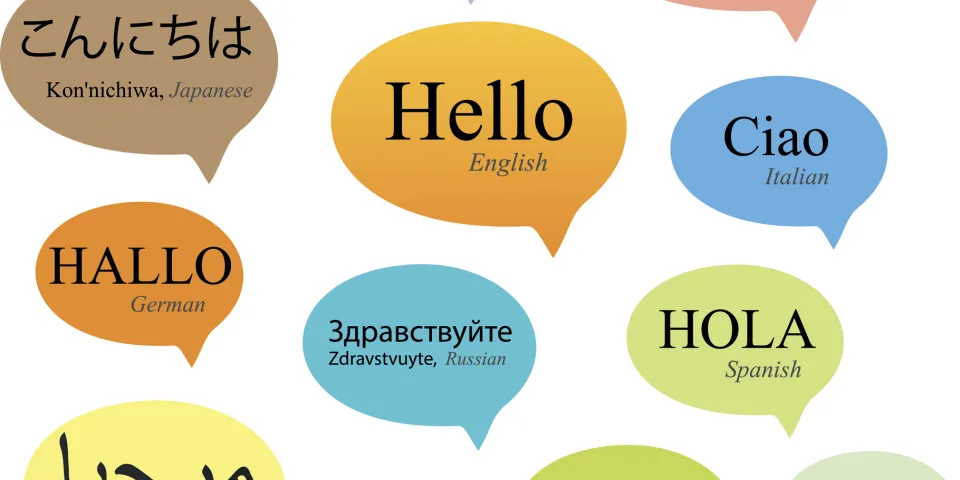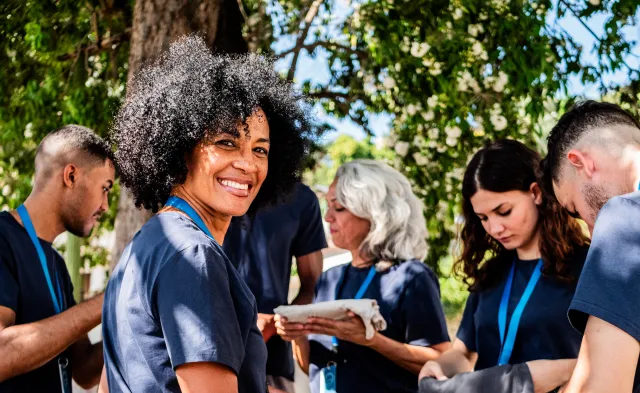Latest
Care in Every Language: The Importance of Bilingual Healthcare Support
Sep 24, 2024

Imagine you are traveling in a foreign country when you suddenly experience extreme pain. You know you must go to a medical facility, but you are worried. You know that you don’t speak the native language, and you are worried about how you will communicate your needs. Can you imagine the relief you would feel if you found out one of the healthcare providers spoke fluent English?
This is the reality that millions of Americans experience every year. According to the United States Census Bureau, 8.3% of the U.S. population 5 years and older indicated that they spoke English less than “very well”. In some counties, this can be as high as 45.8%.
Individuals who are less than comfortable communicating in English, outside of more basic conversational phrases, are at a particular disadvantage when it comes to discussing their health. How many people would you expect to know highly technical medical terms in their second language? Bronchitis, psoriasis, rosacea, and tinnitus are non-life-threatening conditions, but they can sound intimidating if you are unfamiliar with the language.
How Does This Impact Patients?
According to a review published in the Oman Journal, language barriers can adversely impact patient care and lead to bias, misinformation, confusion and physical harm. Many times, these adverse effects have nothing to do with the competence of the healthcare providers or from any form of malice, but from a genuine inability to communicate effectively. This can manifest itself in a variety of ways:
- Medications: One study found that among patients who did not speak the local language, 49% had trouble understanding a medical situation, 41.8% had trouble understanding a medication label, 34.7% were confused about how to use medication, and 15.8% had a bad reaction to medication due to a problem understanding their healthcare provider’s instructions. Even if a healthcare provider prescribes the correct medication, there is no guarantee that the patient will understand how to properly use it or even why they have to take it.
- Access to Care: Language barriers can contribute to poor patient assessments, misdiagnosis, and delayed treatment. According to one study, 66.7% faced a barrier when accessing healthcare, and 20% did not seek healthcare services if these were not readily available for fear of not understanding their healthcare provider. Patients with limited local language proficiency are also likely to miss medical appointments and have difficulties arranging appointments.
- Access to Treatment: No matter how skilled a healthcare worker is, effective communication is vital to ensure more positive patient outcomes. One study showed that 94.3% of nurses reported that communication is important to effectively carry out their work. If you have difficulty understanding patients who do not speak your language, it can lead to wrong diagnoses and medications.
Why We Need Bilingual Care
Research shows that having bilingual healthcare professionals and skilled interpreter services can boost patient health and satisfaction. These professionals play a vital role in the healthcare system through their ability to bridge both the language and cultural gap between patients and their providers.
The study suggests that healthcare organizations would benefit from taking the initiative to utilize their bilingual staff to be trained and certified as medical interpreters. It also recommends focusing on hiring staff who speak the languages of the patients they serve. These steps can go a long way in ensuring patients fully understand their diagnoses and care instructions.
How Can You Make a Difference?
Recognizing that there is a problem is the pivotal first step in creating a solution. There isn’t a one-step solution to addressing the healthcare disparity, but there are a variety of resources that can help inform the framework for building lasting change. These resources include:
Herzing Continuing Education Courses:
Herzing offers a special Spanish for Medical Professionals course to provide healthcare professionals with the introductory tools they need to bridge the communication gap. This course provides knowledge of basic medical phrases to help you better communicate with the Spanish-speaking community. This course skips the "touristy" topics and focuses on the basic medical Spanish phrases you need to know in a medical setting. Whether you're new to the language or just want a refresher, this medical Spanish class is ready to help you learn more.
Multicultural Training:
Herzing offers resources to provide quality care that extends beyond the physical well-being of patients. Whether it is demonstrating an awareness of a patient’s beliefs, race, and values or appreciating their background, there are many resources available to help you become more culturally competent including some of these webinar recordings:
The U.S. Department of Health & Human Services also offers online self-directed training courses in culturally competent nursing care, as well as for physicians, physician assistants, and nurse practitioners.
Patient Advocacy:
Patient advocates play a vital role in breaking down barriers to healthcare, especially for patients who speak little or no English. They ensure that patient's voices are heard and their needs are met, often stepping in to navigate complex medical processes and ensuring proper communication between patients and healthcare providers.
Nonprofit organizations like the Patient Advocate Foundation are essential in this effort. They provide free case management services in multiple languages, specifically tailored to support patients with chronic conditions and debilitating diseases. These services not only help patients understand their medical options but also assist them in accessing necessary care, managing their treatment plans, and addressing any obstacles they may face along the way.
In addition to language support, patient advocates often help with insurance issues, connect patients with financial resources, and provide emotional support during difficult times. Their work is crucial in ensuring that all patients, regardless of language or background, receive the care they need and deserve.
Rely on Your Community:
It is important to acknowledge your limitations as a healthcare professional. No one is perfect and you shouldn’t feel like you have failed because you can’t do it all. That is why there are a variety of communities to reach out to when you feel like you need any help or support. Some organizations you can reach out to include:
- National Association of Hispanic Nurses (NAHN): a nonprofit organization devoted to ensuring high-quality healthcare delivery to Hispanic communities and promoting professional excellence among bilingual and bicultural nurses
- National Alaska Native American Indian Nurses Association (NANAINA): a committed group of persons from every corner of the country, dedicated to the health and well-being of the American Indian and Alaska Native people.
- Nation Black Nurses Association (NBNA): a professional non-profit nursing organization serving as the professional voice for over 308,000 African American nurses and diverse populations.
- Asian American/Pacific Islander Nurses Association (AAPINA): a unified force advocating for equity and justice in nursing and health care for ethnic minority populations.
Ensuring equal access to healthcare for all patients is within reach when healthcare organizations take proactive steps to bridge language barriers. Doctors, nurses, and other medical staff can develop cultural and linguistic competencies that make a world of difference in patient care. Healthcare providers can create an environment where every patient feels understood and supported. These efforts not only improve communication but also foster trust and comfort, which are essential for effective healthcare.
When organizations commit to these strategies, they empower their staff to deliver more inclusive, compassionate care. It's not just about speaking the same language—it's about truly understanding and meeting the needs of every patient who walks through the door. With these tools in place, healthcare can be a place where everyone, regardless of language or background, receives the high-quality care they deserve.
Learn More About Our Career Programs
BLS pay estimates calculate the median annual wage for various occupations. Per the BLS the median wage for an occupation is: "The wage at which half of the workers in the occupation earned more than that amount, and half earned less. Median wage data are from the BLS Occupational Employment and Wage Statistics survey." Bureau of Labor Statistics (BLS), U.S. Department of Labor, Occupational Outlook Handbook 2024. BLS median wage estimates do not represent entry-level wages and/or salaries. Multiple factors, including prior experience, age, geographic market in which you want to work, and degree level and field, will affect career outcomes, including starting salary and earnings as an experienced employee. Herzing neither represents that its graduates will earn the median salaries calculated by BLS for a particular job nor guarantees that graduation from its program will result in a job, promotion, particular wage or salary, or other career growth.
Latest
Recent Blog Posts
Subscribe to our Newsletter
Get the latest news you need to know, from study hacks to interview tips to career advancement. Have it delivered right to your inbox biweekly.








